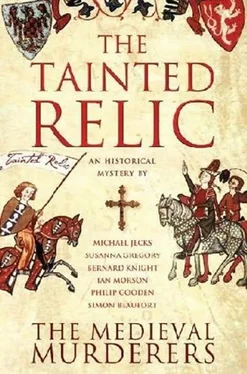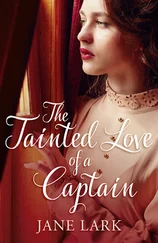There was a court of justice which sat within the precincts of Bartholomew Fair for the duration. It was called Pie-Powder Court. Even though its business was mostly restricted to trading matters (short measures in the ale-tents, coltsfoot mixed in with the tobacco), common thievery and cutpursing certainly fell within its jurisdiction. So we might have marched boldly up to the justices in Pie-Powder and alerted them to these rogues who had the temerity to sing a warning about the very crimes they were about to commit. And yet not one of us-not Jack nor Abel nor I-was going to do anything about it. Every man (and woman) is responsible for his own property. As the old proverb has it: ‘Fast bind, fast find’. And hadn’t Ben Nightingale sung an explicit warning to his patrons, Look well to your purses, of robbers beware ? We had quite enough to do to look to ourselves. Besides, we had other business at Bartholomew Fair.
We were searching for a relic.
At least, that was how WS had described it to me. A ‘relic’.
I liked to think of William Shakespeare as my friend. He’d shown kindness to me from the moment I joined the King’s Men when they were still called the Chamberlain’s. Some of the other Globe shareholders held themselves a little apart from the run-of-the-mill members of the company. Whether it was because of their age or their temperaments or the heavy responsibilities they bore, the Burbage brothers, John Heminges and the others tended to be aloof. But WS had been ready to talk from the first, to give advice and even to make confidences. Or so it seemed at the time to this junior player. And there had been occasions when he had rescued me from the consequences of my own folly or rashness.
Because I’d been grateful to him and because I had a high esteem for the man, I was always prepared to listen when WS asked me to do something, even regarding any request as a privilege. But this was an especially odd request.
At the end of the play the previous day, WS and I had fallen into conversation. We’d been performing in a piece called Love’s Triumph by the playwright William Hordle. The Triumph had lived up to its name and the audience at the Globe clapped and cheered at the end while we did our jig. When we came offstage we were running with sweat-it was a muggy afternoon-but more than content with our reception. I was looking forward to a drink in the Goat and Monkey once I’d got out of my costume in the tiring-house.
Our costume man is Bartholomew Ridd, a fussy fellow as those in charge of stage clothes tend to be, I’ve noticed. Like others of his trade, he seems to think that the purpose of plays is to display his finery. Actors are no more than clothes-horses. He’s very hot on damage, ready to rebuke anybody whose outfit catches on a nail or is accidentally sullied with a spillage of beer. For some reason Master Ridd is particularly suspicious of me and always takes a personal interest in the condition of my costume when I’ve come offstage. I used to get annoyed with this but now I try to humour him. Anyway, all this meant that, as usual, I was one of the last to leave the tiring-house.
In the dim passageway outside I almost collided with William Shakespeare. We walked together towards the side door that gave on to the alley known as Brend’s Rents. I couldn’t have explained why, but I had the sense that he’d been waiting for me.
‘Off to the Goat and Monkey, Nick?’ he said when we were outside in the alley.
‘Just for a quick one-or a quick two,’ I said, wondering whether he wanted to accompany me there. The Goat, not a very salubrious alehouse perhaps but the players’ local, wasn’t the sort of place usually frequented by the shareholders. We walked in its direction. There were a few other people around. It was that stage of the day when business is more or less done but the evening’s pleasures have yet to begin.
William Shakespeare and I had to proceed carefully at certain points in the walk. This area of Southwark around the Globe playhouse and the bear garden is criss-crossed by channels and ditches that feed into the river. Bridges carry one over the dirty streams. They are often little more than a single warped plank, and to cross them requires concentration.
‘Hot work onstage this afternoon,’ said Shakespeare.
‘But enjoyable.’
‘Oh yes, enjoyable.’
I glanced at my companion. He hadn’t taken a part in Love’s Triumph -indeed, WS took little part in playing these days-but he generally spent his mornings and afternoons at the Globe. The mornings were given over to rehearsals and (for the shareholders) business matters while the afternoons were for performances. Even though his acting days were mostly done with, WS liked to be in attendance at performances, ready to offer a word of advice or encouragement. I sometimes wondered when WS actually wrote his plays. I visualized him sitting up late into the night in his lodgings in Mugwell Street north of the river, covering the paper by candlelight, his hand flowing smoothly across the blank sheets. Unlike some other writers I’ve known he never came to work with inky hands.
‘A good writer is that William Hordle,’ said WS.
‘We’ve already done his…let me see, his Love’s Diversion and Love’s Despair and now there’s been his Love’s Triumph ,’ I said, asking myself where this conversation was headed.
‘With every play he grows better-and William Hordle was good to begin with,’ said WS, who was generous in his assessment of other men’s work. ‘He skipped the rough apprentice stage. Hordle jumped over that hurdle , you might say.’
Experience had taught me to ignore WS’s puns, which varied from the passable to the terrible. Instead I said, ‘Like you, William? You never were an apprentice?’
‘Why do you say so?’
‘It is reported that you never blotched a line.’
Now it was WS’s turn to glance at me. The sun was in our faces. His eyes were shaded by his hat and I couldn’t read his expression. But then, he was a man who was always hard to read. We came to one of the narrow bridges spanning a channel which we had to cross single file. The smell of the river is never agreeable in high summer but the aroma of a Southwark ditch is enough to flatten a fishwife. If you fell in-and people did fall in from time to time on their way to the bear pit or from the tavern-you’d be unlucky to drown in the couple of inches of sludge that adhered to the bottom but you’d quite likely be smothered by the stench.
When we were safely across, WS stopped and took me by the arm.
‘Those reports are wrong,’ he said. ‘I had my rough apprenticeship, when I bodged and blotched with the best of them.’
This talk of apprenticeship was interesting. I’d always been curious about Shakespeare’s early life in London. But WS wasn’t talking now to satisfy my curiosity. Just as I’d sensed that our encounter outside the tiring-house hadn’t been accidental, so I realized that we had now come to the nub of the matter. I couldn’t imagine what he wanted to tell me, though. That Shakespeare could have made mistakes like any other tyro playwright was hardly surprising, for all his reputation now. But what did this have to do with the man who was famed as the creator of Falstaff and Prince Hamlet?
‘Nick, enough of this beating about the bush. I have a request to make. You’ve been to St Bartholomew’s Fair?’
‘Not this season.’
‘Maybe you are intending to go?’
‘Maybe,’ I said. I had been meaning to wander through the fair, as it happened, but was slightly reluctant to confess this to WS for fear that he might consider me a gawping provincial. The traders at Bartholomew are Londoners while those who come to buy (or to be fleeced) tend to come from outside town, for this is a fair that draws people from all over the kingdom.
Читать дальше












